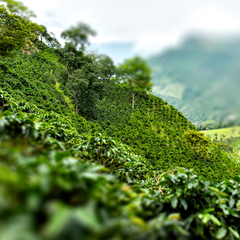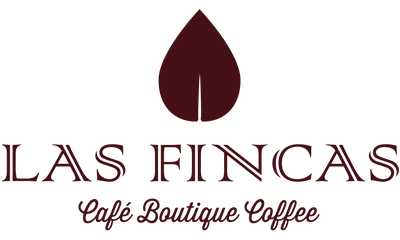February 18, 2022
By definition specialty coffee is a term applied to beans of the highest taste standard arriving from a single origin or single estate. If we were to trying to define specialty coffee in taste rather than words, Oso farms coffee from the rainforests of Costa Rica would be the best interpretation we could come up with. The farms are a family owned business headed by Jenny and her husband Eric. She is a 4th generation coffee farmer and the founder and manager of the farms. Oso farms own their micro mill and this allows the family to have full control of the process. The coffee never scores below mid 80’s at cupping for quality making them specialty grade standard. Their practices are 100% environmentally conscious to the mountain and the rain forest where they are grown. The mountain provides perfect drainage, Banana trees are planted among the coffee trees to mostly help enrich the plants. The fertilizer used is made from harvested soil from the grounds of the neighbouring rainforest and fermented separately to add nourishment to the coffee trees. Coffee is grown at 1,250 m.a.s.l. to allow for a slow and steady growth of the coffee cherries while being watered by the mountain rains. The farm encourages the local Chiquiri tribe to help harvest the cherries from October to December by offering up to 50% higher pay standards, more than if they worked at other local farms. The Chquiri in return engage in the same quality output commitment and only the red and ripe cherries are hand picked. The cherries are stripped from their outer skin the very same day they were picked and only the sweets fruit pulp is left to ferment on top of the coffee beans, what is known as a honey process. Let me explain you a bit more about the honey process if you permit me.


The process appeared out of necessity, really. In 2005 after the devastation of hurricane Paulina throughout Central America coffee farmers were caught in the middle of the wet processing season (the most used process in Central American coffees). The government of Costa Rica passed a decree that water for non-essential use was forbidden. So farmers were forced to figure ways to save the years harvest and one of the results was the honey process. It consists of leaving the fruit pulp to ferment on top of the coffee beans rather than washing it off. There are three levels of fermentation: Yellow, Brown and Black depending on how long the pulp is left on the beans it will oxidize, like bananas do and change its colour hue. As the fermentation is taking place the sugars in the pulp caramelize and start transforming to a molasses state, resulting in the term “honey”. As we well know necessity sometimes is the mother of invention and in this case gave way to hybrid process between wet and dry with a prolonged fruit fermentation that enhances the final sugar content in the beans. The results of this really shine when the coffee is roasted, the sugars make the coffee sweeter and more aromatic, with other notes that would not be evident in the cup otherwise.
So back to Oso farms processes, the coffee is put on raised African beds after the fruit pulp is exposed and left to dry on the beans until yellow the first stage of honey. The process is carefully monitored until it reaches about 40% moisture content then the leftover pulp is washed of and the coffee is dried again until it finally gets to about 12% moisture content at this point is ready to go to us roasters. Running a farm in this way requires huge efforts and work, but this is the very definition of quality and standard that really defines a specialty grade coffee. “Oso” in Spanish translates to bear, but I guess that in coffee terms it translates to huge undertakings to achieve great results. Lucky for us and you dear friends and customers of Las Fincas we have these beans available in our pressurized can version and the availability is limited. I really recommend this coffee for all of you fans of the pour-over it is nothing more than pure honey sweetness…
February 18, 2022
As we say “every coffee tells a story”, and we have one to tell you. In January we received bags of one of the first five micro-lots produced in Burundi by the “Turihamwe Turashabora” investment group and imported by JNP Coffee in Massachusetts. JNP Coffee’s deep ties to Burundi lie in the concept of collaboration with farmers in Burundi to produce coffee of specialty quality with the terroirs’ best character and together share the success of their work by earning financial premiums. In the province of Ngozi there are seven women that saved the premiums earned from JNP coffee through the IWCA premium program. In 2019 they used their savings to form a small financial group named “Turihamwe Turashabora” which in Kirundi translates to “Together we can”. They used their funding money to build their own washing station named “Gitemezi” after the local hill where the station stands. These women have the belief that good quality coffee is a way out of poverty. They have a goal to increase their capacity to 1,200 bags a year in the following years. The financial benefits for these women allow them to participate in new financial literacy programs sponsored by JNP Coffee and Burundi Friends International, the program helps them make appropriate economic decisions.




The coffee is of the Bourbon variety and its full of the citrus and sweet molasses and dark bakers chocolate notes that prized Burundian coffees are known for. Our mission at Las Fincas is to deliver coffee full of quality and rich of stories, such is the one of this burundian micro-lot tells so sweetly. The traceability of this coffee invites our customers to know the impacts their purchases have at origin and the benefits that this provides to farmers like the women of Turihamwe Turashabora station. The most effective financial models are those where women play the principal role. This allows women to provide stability for their families and ensure a source of income. This also helps women increase productivity, decrease infant mortality and promotes better nutrition and health in coffee farming families.
Coffee industry in the country started in 1922 with Belgian Colonialism and remained private until 1976. The industry flourished between 1976-1991 before the civil war of liberation. In 2019 an outbreak of malaria dropped coffee output for about a third triggering a new proposal to nationalize the industry in 2020 with a new $55 million investment from the world bank to help farmers boost output of 30,000 tons by 2023. We don’t know what the impact will be for the private ownership for the moment but we expect that this should result in a new positive era for the production of coffee in Burundi as it has happened before.
We encourage you to try this amazing coffee that is not only delicious but also represents how the future of specialty coffee relies in the collaborative efforts to produce quality at origin while empowering the farmers that produce it and at the end of the chain consuming these coffees of amazing character. We will be roasting the first lots as soon as we have enough orders to start shipping them out. We will be packing them in 150g aluminum can with our innovative pressurized process. If you would like to reserve and pre-order some cans of Turihamwe Turashabora please subscribe and we will let you know when the coffee is available for purchase.
Get on the list! Sign up and be the first to know about our exclusive offers, limited edition micro-lots, private tasting events and more... don't miss out!
© 2025 Las Fincas Coffee.
Powered by Shopify
